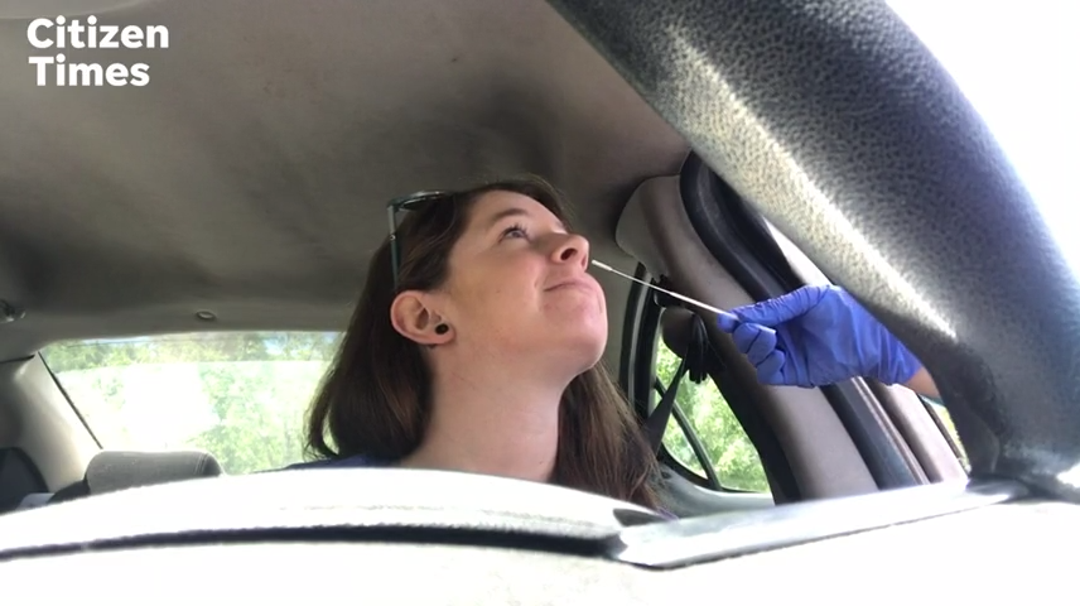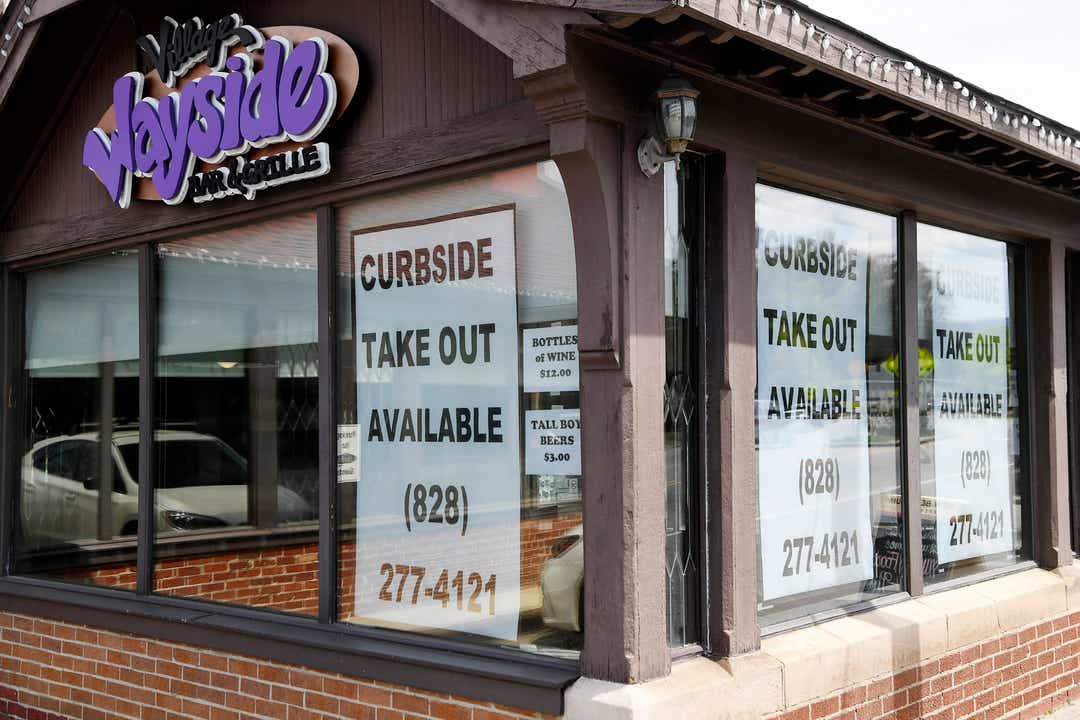ASHEVILLE - Hospitalizations because of COVID-19 were at a record high in North Carolina on July 23, while the state reported an additional 28 people died because of the disease.
As of noon Thursday, 1,188 people were in hospitals with the novel coronavirus in the state, according to the North Carolina Department of Health and Human Services. The previous highest was 1,179 coronavirus hospitalizations on July 16 and 20, according to its dashboard.
NCDHHS reported Thursday that a total of 1,726 people have died statewide as a result of COVID-19. That's an increase of 28 over Wednesday.
The state tallied 106,893 lab-confirmed cases of COVID-19 as of noon July 23, an increase of 1,892 from the previous day. That comes five days after the state had a record 2,481 new cases Saturday.
On Thursday, 30,430 tests were completed in the state, the fourth-most since at least mid-June. The most recent data reported by the state on its dashboard shows 9% of all tests July 22 were positive. The average daily positivity rate had been about 9% this month. The total number of completed tests increased to 1,523,675.
The state-reported numbers differ slightly from the Johns Hopkins University report in the graphic above. As of about noon July 23, JHU counted 3,987,584 confirmed cases and 142,312 deaths as a result of COVID-19 in the United States. That's more than 1,100 additional deaths than at the same time Wednesday. JHU's worldwide tally was 15,284,136 cases and 624,665 deaths.
As of about noon Thursday, Buncombe County reported on its coronavirus dashboard that there were 1,139 cases in the county, up 27 from the previous day. However, the state reported Thursday that Buncombe had 1,292 cases, up 44 from the previous day. The county has said that its dashboard would lag behind the state's tally. The number of COVID-19 related deaths in the county was 43, according to its dashboard.
Confirmed cases in other Western North Carolina counties, according to state counts:
- Avery: 53 cases, 0 deaths.
- Cherokee: 158 cases, 2 deaths.
- Clay: 41 cases, 0 deaths.
- Graham: 17 cases, 0 deaths.
- Haywood: 200 cases, 0 deaths.
- Henderson: 1,210 cases, 52 deaths.
- Jackson: 317 cases, 3 deaths.
- Macon: 407 cases, 1 death.
- Madison: 27 cases, 0 deaths.
- McDowell: 429 cases, 4 deaths.
- Mitchell: 64 cases, 1 death.
- Polk: 121 cases, 5 deaths.
- Swain: 86 cases, 2 deaths.
- Transylvania: 101 cases, 1 death.
- Watauga: 191 cases, 0 deaths.
- Yancey: 68 cases, 0 deaths.
The Citizen Times is providing this story for free to readers because of the need for information about the coronavirus. We encourage you to further support local journalism by subscribing.
Asheville schools change reopening plan to fully remote learning
Asheville City Schools announced July 23 that it will begin the school year with at-home remote learning for at least nine weeks for K-12 grades, according to a media release.
David Thompson reports that ACS had originally planned to have K-sixth grades return to school on a rotating basis, with half meeting in-person one week while the other half learns remotely. Every week, the two groups would switch. Seventh-12th grades were set to complete all work remotely.
The first day of school is still set for Aug. 17.
"According to Buncombe County Health and Human Services, our county’s COVID-19 numbers continue to accelerate," ACS spokeswoman Ashley-Michelle Thublin wrote in a press release. "Therefore, we believe it’s imperative to have a slower reopening that allows us to carefully plan and maintain safety protocols for all campuses."
► Asheville City Schools will start school year with virtual learning only
Health director: This is more important than testing
In the midst of an acceleration in COVID-19 infections in Buncombe County, the top local health official explained the choice to stop community testing and said there were even more important things the public should do to stem the spike in cases.
Joel Burgess reports that county Interim Public Health Director Dr. Jennifer Mullendore addressed the public and the media July 23, saying there were still testing options for the insured and uninsured after the county's decision to temporarily stop its testing program.
But with the county, state and nation facing an acceleration in cases, the most important thing residents can do is wear masks, wait 6 feet apart from others and wash hands, she said.
► This is more important than testing during Buncombe, Asheville coronavirus 'acceleration'

Community testing stopped for now
A popular COVID-19 community testing program meant to help the uninsured will be stopped just as infections are accelerating in Buncombe County, Joel Burgess reports.
County Health and Human Services made the announcement late July 22, saying a local nonprofit health clinic, which had been providing much of the on-the-ground support, was overwhelmed and was dropping out of the testing program.
The testing program has drawn long lines, processing more than 850 people per week. One site at the Ingles in Swannanoa saw cars backed up onto the highway this month. While aimed at the uninsured, those with insurance could also get tested.
County health and government officials pledged to restart the program as they scrambled to reorganize it.
► County coronavirus testing stopped as Asheville area cases accelerate; Plans to restart
How much will Smokies and parkway's economic boost be dampened?
The Great Smoky Mountains National Park and Blue Ridge Parkway have a combined $2.8 billion dollar economic impact in surrounding communities.
Both parks were closed at some point to help limit the spread of the novel coronavirus. Since reopening, visitation levels have been lower as fewer people are traveling.
Karen Chávez reports on the pandemic's effect on the economic impact of the parks in this story for subscribers.
► Will Great Smokies and Blue Ridge Parkway's $2.8 billion impact last through COVID-19?

Has opening up hotels contributed to the local case surge?
Since Buncombe commissioners voted three weeks ago to lift local restrictions on short-term lodging businesses, hotel occupancy has risen by a range of 9-30%, with numbers varying from week to week and reservations peaking over July 4 weekend.
Meanwhile, cases of COVID-19 have more than doubled in the county.
Mackenzie Wicker reports that local health officials say the rise in cases is more likely associated with the reopening of businesses and high-risk activity among residents than overnight travel to the area. They stressed that tourists were already taking day trips to Buncombe while the limitations on hotel capacity were in place.
Dr. Kimberly Powers, an associate professor of epidemiology at the UNC Gillings School of Global Public Health who studies infectious disease transmission, said where tourists are sleeping is "less important than where they’re spending most of their time among other people."
► Hotel occupancy and COVID cases are up, but health experts say they aren't necessarily related

Commercial real estate market braces for rough patch ahead
Local commercial real estate company owners say business failures have been relatively low so far, but they're bracing for a possible surge late this year and into next. Commercial real estate, like every other segment of the economy, is fighting its way through a COVID-19 pandemic that shows few signs of abating.
"I think the hard part is yet to come," said Jack Cecil, president and CEO of Biltmore Farms, which developed Biltmore Park and operates four hotels, among other ventures. "And a lot of this depends on your tenant mix."
Cecil thinks national tenants of publicly held companies are more likely to weather the storm because of deeper pockets and more access to capital. Regional companies or local companies with strong balance sheets should be all right, too.
"It's the startups and the younger companies I tend to worry about," Cecil said, referring to retail companies and restaurants. "Then if you put it in the macro sense of the economy, I think we still have yet to see the worst of it from commercial office tenants."
John Boyle reports on the commercial real estate outlook in this story for subscribers.
► COVID-19 uncertainty has commercial real estate market bracing for rough waters

Is takeout safe?
Nearly two months into the state's Phase 2 of reopening, more local restaurants have begun to publicly announce confirmed COVID-19 cases.
Those announcements are strictly voluntary: Neither the county nor the state require a business to report positive cases on their premises.
Those businesses are also not required to close, though Communicable Disease staff work with the restaurant to perform contact tracing, with Environmental Health guiding the impacted business through sanitation.
Mackensy Lunsford asks the question, is the food safe? The answer:
► Your COVID-19 questions answered: Is takeout safe? Here's what health officials say
"need" - Google News
July 24, 2020 at 05:06PM
https://ift.tt/39pAPA7
Coronavirus: What you need to know in Asheville, WNC on July 24 - Citizen Times
"need" - Google News
https://ift.tt/3c23wne
https://ift.tt/2YsHiXz
Bagikan Berita Ini















0 Response to "Coronavirus: What you need to know in Asheville, WNC on July 24 - Citizen Times"
Post a Comment